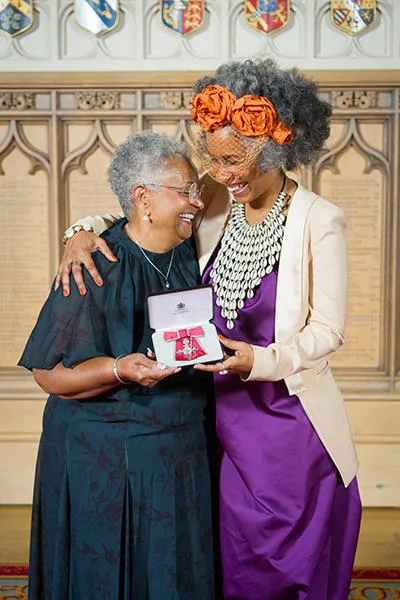 ‘It was lovely receiving the MBE in 2024. My mum is 81 and she was ecstatic,’ says Karen, seen here with her mum after receiving her award
‘It was lovely receiving the MBE in 2024. My mum is 81 and she was ecstatic,’ says Karen, seen here with her mum after receiving her award
Are there any achievements you’re particularly proud of?
It was lovely receiving the MBE in 2024. My mum is 81 and she was ecstatic. It was lovely receiving the Fellowship of The Queen’s Nurse Institute, too. And I was proud to receive my honorary Doctorate from Buckingham New University.
But the greatest achievement for me has being finding my authentic voice and my authentic self.
The other day, someone said I was ‘a nurse’s nurse’, which I loved! I’m proud I’ve been able to stay true to my younger self, always trying to lead with kindness and compassion.
You’re also a Trustee at HelpForce and a volunteer at Prostate Cancer UK…
My first trustee role was setting up the Mary Seacole Trust. It was a moment where I recognised that there are very few black senior leaders. So, I’m a role model, just like nursing pioneer Mary.
My current role at HelpForce promotes volunteering, which is super important. The greatest gift we can give people is our time. I’m a volunteer myself and it’s so good for your soul.
My Prostate Cancer UK work was inspired by my dad, who was diagnosed at an advanced stage. I wanted to save him and make him better, but I couldn’t. I now want to prevent people like him having an untimely death, particularly as the black community is more affected. One in four black men will get prostate cancer, which is a huge number. I want to make sure that people get diagnosed early and get treated, because my dad never had that. I’m not sure how my dad would feel about having his name and his pictures on the internet as he hated social media. But I think he’d understand that his legacy inspired me to hopefully save a few lives.
What is next for you?
I’ve just taken on a job as Chief Nurse for London at NHS England at one of the most pivotal moments for the NHS, so I have my work cut out for me there.
I’m getting to the point where my career is about legacy and what I can do to have the biggest impact. So, it will be continuing to inspire the next generation, helping to lead nationally and build an NHS that’s fit for the future. When I decide to step away, I want to feel that I’ve made a difference and that I’ve inspired people to be their best.
Finally, is there a piece of advice for those wanting to follow in your career footsteps?
I’d say to anyone wanting to go into nursing or healthcare, just do it. It’s amazing! There are 350 roles in the NHS, so you can build you entire career within it. That’s what I’ve done. I’ve moved around, but I’ve worked in the NHS pretty much my whole career.
You can find your place somewhere in the system and help people. You can make a real difference to society and people’s lives, and there aren’t many jobs that give you that level of satisfaction. It’s a wonderful career for life.